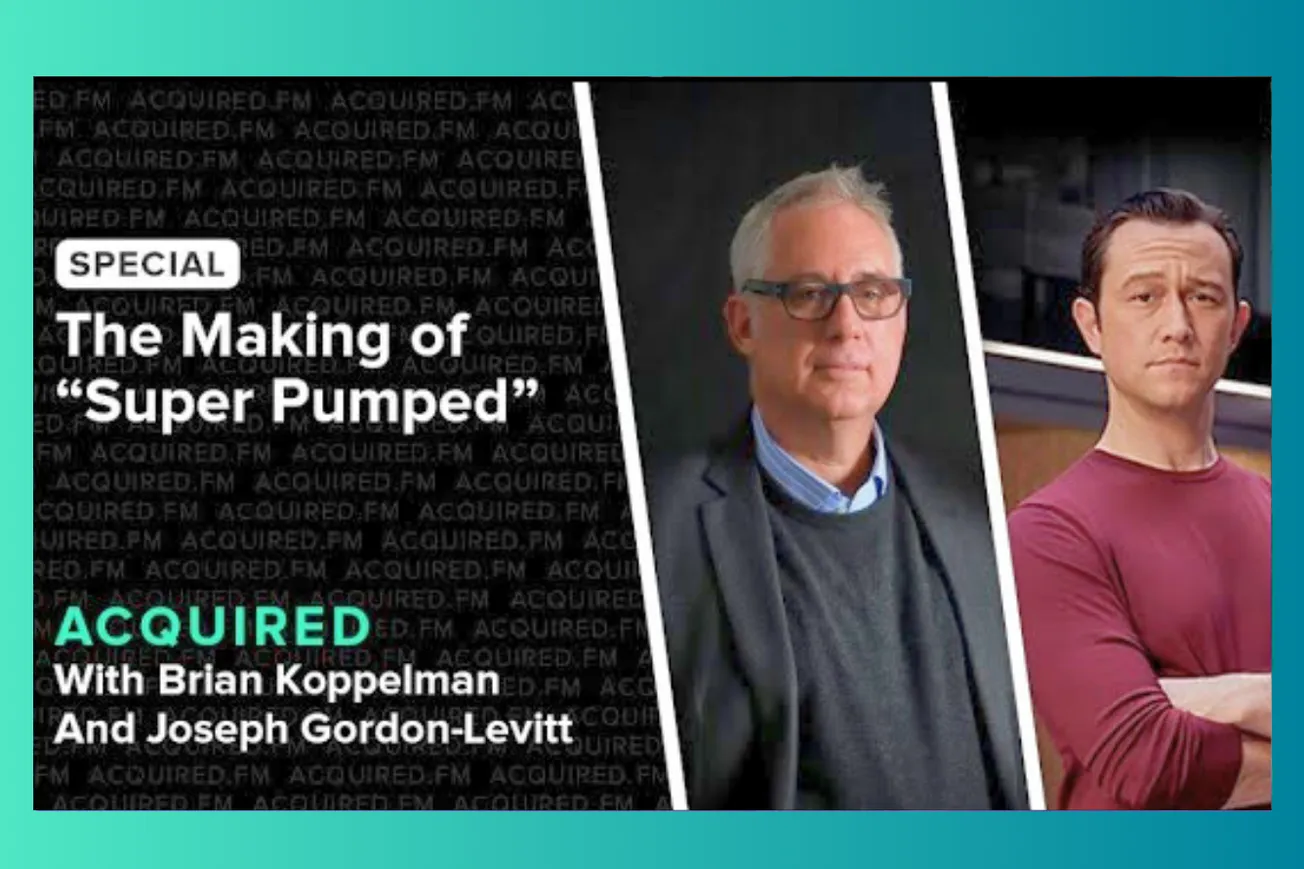Table of Contents
Brian Koppelman and Joseph Gordon-Levitt reveal how they transformed the Uber story into compelling television, exploring the moral complexities of disruption and the costs of growth-at-all-costs capitalism in Silicon Valley.
Key Takeaways
- Super Pumped represents the mainstreaming of Silicon Valley stories as entertainment, showing how tech narratives have become central to American culture
- The creative team used innovative storytelling techniques including unreliable narrator perspectives and form-breaking cinematography to capture the disruptive nature of the subject matter
- Joseph Gordon-Levitt's casting came together through a rare perfect alignment - he was the first choice and said yes immediately after reading the script
- The show deliberately avoids glorifying Travis Kalanick by showing the human costs of disruption and the consequences of "profits above all" mentality
- Brian Koppelman had existing relationships with figures like Bill Gurley and Marc Andreessen but maintained strict separation between personal knowledge and source material
- The series raises fundamental questions about when revolutionary change becomes fascistic and whether the benefits of disruption justify the costs
- Both creators emphasize artistic integrity over commercial considerations, focusing on intrinsic motivation and authentic storytelling
- The production involved Mike Isaac (book author) as daily presence in the writers' room, ensuring journalistic accuracy while allowing dramatic interpretation
Timeline Overview
- 00:00–12:30 — Project Genesis: How Mike Isaac DMed Brian Koppelman on Twitter months before book publication, leading to immediate commitment and partnership
- 12:30–25:15 — Casting and Collaboration: The rapid casting of Joseph Gordon-Levitt as first choice, agent Warren Zavala's role, and the rare alignment of creative vision
- 25:15–38:45 — Moral Complexity and Character: Discussing Travis Kalanick's portrayal as neither hero nor villain but complex human, balancing inspiration with consequences
- 38:45–52:20 — Artistic Choices and Innovation: Form-breaking storytelling techniques, unreliable narrator perspectives, and adapting print journalism for visual medium
- 52:20–65:15 — Research and Source Material: Mike Isaac's daily presence in writers' room, accessing original sources, and maintaining journalistic integrity
- 65:15–78:30 — Silicon Valley as Subject: The broader themes of disruption, capitalism, and growth-obsessed culture that Uber represents
- 78:30–91:45 — Production Challenges: Filming locations, casting real-life figures, and technical aspects of bringing recent events to screen
- 91:45–105:20 — Acting Process: Joseph Gordon-Levitt's preparation, research with Uber insiders, and challenges of portraying controversial figures
- 105:20–118:15 — Creative Process: The difference between knowing work is good versus bad, artistic integrity, and intrinsic versus extrinsic motivation
- 118:15–130:00 — Recommendations: Brian and Joe's cultural recommendations including books, podcasts, and films
When Tech Stories Become Mainstream Entertainment
- The transformation of Silicon Valley narratives from niche business stories to mainstream entertainment represents a cultural shift where technology companies have become central to American identity
- Brian Koppelman's observation that "we are fascinated by people who put it all on the line" explains why venture capitalists and tech founders make compelling dramatic characters
- The comparison to "The Big Short" and Christian Bale playing Michael Burry shows how financial and tech stories follow similar entertainment patterns - audiences connect with high-stakes decision-making
- Joseph Gordon-Levitt notes that portraying confidence makes characters instantly more winning on screen, even when they're doing questionable things
- The series represents the culmination of a journey that started with films like "The Social Network" - tech stories have proven they can sustain entire television seasons
- The cultural fascination with disruption and "changing the world" rhetoric provides rich dramatic material that resonates beyond Silicon Valley insiders
The Art of Portraying Moral Complexity
- Joseph Gordon-Levitt's approach to Travis Kalanick focused on showing "a whole human" rather than reducing him to headlines about questionable decisions and unethical behavior
- The actor interviewed numerous Uber employees to understand Kalanick's inspiring and compelling qualities that attracted talent, not just his controversial actions
- The creative challenge involved making audiences "love this guy" before confronting them with his harmful decisions, creating internal conflict about their sympathies
- Brian Koppelman emphasized they needed an actor who "wouldn't try to protect himself at every turn" and would be willing to do morally questionable things on screen
- The show deliberately avoids the trap of many Silicon Valley stories that inadvertently glorify their protagonists by showing clear consequences for destructive behavior
- The final episodes shift perspective and "lens changes" to reveal the full cost of Travis's approach, similar to how "Wolf of Wall Street" ultimately reveals Jordan Belfort's emptiness
Innovative Storytelling Techniques
- The series employs "unreliable narrator" perspectives, showing how Travis remembers events versus how they actually happened, with visual techniques like backgrounds falling away
- This approach acknowledges that much of Silicon Valley mythology consists of apocryphal founding stories that don't match reality
- The creative team used "form-breaking" cinematography and storytelling conventions because they were depicting disruption, allowing them to disrupt traditional television narrative structure
- Mike Isaac's book provided journalistic foundation, but television adaptation required innovation to translate internal dialogue and complex business relationships to visual medium
- The series balances source material accuracy with dramatic interpretation, maintaining factual integrity while creating compelling scenes like the Waverly dinner
- Technical challenges included recreating recent events where original video footage wasn't available, requiring creative solutions like casting actors to play Jeff Bezos in YouTube clips
The Role of Source Material and Journalism
- Mike Isaac was present in the writers' room for 94 out of 100 days, serving as co-executive producer and fact-checker rather than script writer
- The collaboration involved Isaac accessing his original sources during writing sessions, sometimes bringing interview subjects into Zoom calls with writers
- Brian Koppelman maintained strict separation between his personal relationships with figures like Bill Gurley and Marc Andreessen and the show's content
- The production team could call on Isaac's network of sources to verify details and understand what actually happened in private meetings and conversations
- This level of journalistic integration is unusual for entertainment productions and reflects the importance of accuracy when dramatizing recent real events
- The approach balances dramatic interpretation with factual foundation, ensuring creative choices serve truth rather than replacing it
Silicon Valley Culture and Capitalism Critique
- Joseph Gordon-Levitt identifies the core theme as examining what happens "when the modus operandi is profits above all shareholder value before everything"
- The series uses Uber as a case study for broader Silicon Valley culture that prioritizes "growth growth growth" regardless of human impact
- Brian Koppelman poses fundamental questions about disruption: "is the benefit of having this new utility worth what's on the other side of the ledger?"
- The show explores whether revolutionaries inevitably become fascists, referencing Hannah Arendt's concept of "lost treasure" in revolutions
- Bill Gurley's character represents the moral complexity of venture capitalists who must choose between protecting founders and protecting their investments
- The series suggests that the convenience of services like Uber comes with hidden costs to workers, communities, and democratic institutions that users rarely consider
The Creative Process and Artistic Integrity
- Both creators emphasize intrinsic motivation over external validation, with Brian Koppelman noting "if you know it's bad, it's fucking bad" regardless of commercial success
- Joseph Gordon-Levitt describes the challenge of maintaining childlike imagination while "straddling a hornet's nest of logistical nightmares" on film sets
- The collaboration involved unusual creative alignment where first choices were available throughout casting, from Gordon-Levitt to Kyle Chandler to Uma Thurman
- Working schedules reveal the physical demands of television production, with 12+ hour days and constantly shifting call times that disrupt normal life rhythms
- The creators' friendship with Ryan Johnson and reference to Rilke's "Letters to a Young Poet" reflects deep engagement with artistic traditions and mentorship
- Both emphasize that artistic success comes from "going as deep as you possibly can into yourself" rather than trying to please external audiences
The Business of Entertainment Production
- The project began when Mike Isaac DMed Brian Koppelman on Twitter months before book publication, showing how modern media deals can start through social media connections
- Agent Warren Zavala's role demonstrates how key intermediaries can align creative talent with appropriate projects through long-term relationships and understanding
- Showtime's willingness to greenlight an expensive series about recent tech industry events reflects the commercial viability of Silicon Valley stories
- The production required complex logistics including location shooting in San Francisco while primarily filming on Paramount lot soundstages in Los Angeles
- Casting real-life figures like Sergey Brin (played by David Krumholtz) required balancing dramatic interpretation with public personas
- The series represents significant investment in recent history storytelling, betting that audiences want to understand Silicon Valley's impact through entertainment
Standout Quotes and Insights
"We are fascinated by people who put it all on the line... Our culture is fascinated by people who step up to the craps table and say I'm gonna put it all on hard eight" — Brian Koppelman on why Silicon Valley figures make compelling dramatic characters
"I want to actually make the audience love this guy but also then be confronted with oh no this person who I was sort of falling in love with is doing some really seemingly terrible things" — Joseph Gordon-Levitt on the moral complexity of portraying Travis Kalanick
"What happens when the modus operandi is profits above all shareholder value before everything... it's about to drive the human race off a cliff" — Gordon-Levitt on capitalism's growth obsession
"Is the benefit of having this new utility worth what's on the other side of the ledger?" — Koppelman's central question about disruption
"All you can really do if you want to be an artist... is just go as deep as you possibly can into yourself" — Gordon-Levitt on artistic integrity, quoting Rilke
"I can still write. They can't take away from me the ability to make stuff" — Koppelman's realization about creative resilience after early career setbacks
"Maybe you won't but maybe you will [have empathy for your Uber driver]" — The show's modest hope for changing audience perspective
Cultural Impact and Future Implications
- Mainstreaming of Tech Stories: Silicon Valley narratives have proven sustainable for long-form television, suggesting more tech industry stories will receive entertainment treatment
- Moral Complexity in Business: The series contributes to growing cultural conversation about the costs of disruption and growth-obsessed capitalism
- Entertainment as Social Commentary: Shows like Super Pumped serve as contemporary social criticism, using dramatic storytelling to examine systemic issues
- Celebrity Culture: Tech founders increasingly receive celebrity treatment typically reserved for entertainers, politicians, and athletes
Conclusion
Super Pumped represents a cultural moment where Silicon Valley stories have become central to American entertainment, reflecting technology's dominance in contemporary life. The series succeeds by treating its tech industry subject matter with the same sophisticated storytelling techniques used for political dramas or crime stories, recognizing that venture capitalists and startup founders have become as culturally significant as traditional power brokers.
Brian Koppelman and Joseph Gordon-Levitt's approach emphasizes moral complexity over simple villainization, using Travis Kalanick's story to examine broader questions about capitalism, disruption, and the human costs of innovation. Their commitment to artistic integrity and journalistic accuracy while creating compelling entertainment demonstrates how serious storytelling can illuminate contemporary issues without sacrificing dramatic impact.
The production process itself, with its unprecedented integration of source journalism and creative interpretation, may establish new models for adapting recent real events into entertainment. Most importantly, the series uses individual character study to examine systemic problems, asking whether the convenience and innovation of modern technology platforms justify their human and social costs.
Practical Implications
For Entertainment Industry:
- Tech industry stories provide rich dramatic material with built-in audience interest and cultural relevance
- Successful adaptation requires balancing journalistic accuracy with dramatic interpretation and character development
- Recent events can be adapted quickly if proper source material and creative talent align effectively
- Moral complexity and character development prevent glorification while maintaining audience engagement
For Silicon Valley:
- Entertainment portrayals increasingly shape public perception of tech industry figures and companies
- The costs and benefits of disruption receive greater scrutiny through mainstream cultural examination
- Founder behavior and corporate culture become subject to dramatic interpretation and artistic criticism
- Private industry events become public cultural property through entertainment media
For Artists and Creators:
- Intrinsic motivation and artistic integrity provide sustainable creative foundation over external validation
- Collaborative relationships between journalists and creative teams can enhance both accuracy and dramatic impact
- Complex moral questions make more compelling entertainment than simple hero/villain narratives
- Contemporary subject matter requires careful balance between criticism and understanding
For Business Leaders:
- Executive behavior and corporate culture may receive entertainment industry attention with lasting cultural impact
- Growth-obsessed business models face increasing artistic and cultural examination
- Leadership decisions carry potential reputational consequences beyond immediate business results
- Personal character and moral complexity become relevant to professional legacy and public perception





![This New Bitget Platform Changes the Game [Literally Gold]](/content/images/size/w1304/format/webp/2026/02/bitget-launches-universal-exchange-gold-usdt.jpg)